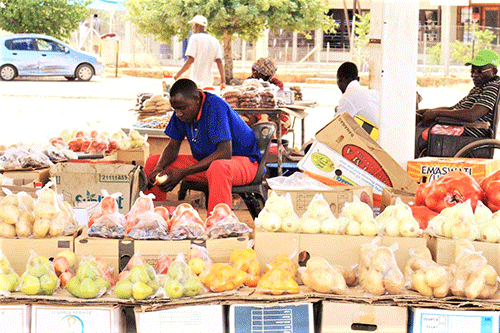Operational Guidelines for Code of Conduct for the informal sector were introduced this week after being drafted by the Namibia Informal Sector Organisation (NISO). The ultimate objective of these operational guidelines is to advance avenues of support to the informal sector to be a conducive and profitable entrepreneurial sector.
Informal trading remains a critical part of economic activities in the country but it remains one of the most vulnerable sectors due to operational instability and unstable support.
Attending the launch of the guidelines, trade and industrialisation minister, Lucia Iipumbu, noted the sector is a major source of employment and livelihoods for many Namibians, most of whom are women.
Noting that estimates of the size of this sector, its contributions, and composition vary widely within regions and countries, Iipumbu said: “Allow me at the onset to duly appreciate the Namibia Informal Sector Organisation and its partner stakeholders in crafting this important guiding document which is meant to set the tone in terms of regulating the rights, obligations, and responsibilities of all stakeholders in the informal economy.”
She added that establishing the nature and extent of the informal economy in any country is a necessity for the development of sound and targeted policies, strategies and interventions.
“Furthermore it is important to identify the necessary gaps with the aim of facilitating the transition of the informal sector into the mainstream economy,” said Iipumbu.
Moreover, the trade minister stated the Code of Conduct and the development of a Position Paper on Namibia’s informal economy comes at the right time when her ministry is making great strides in work related to the development of the National Informal Economy, StartUps and Entrepreneurship Policy and Attendant
Bill.
“This policy aims to develop the informal economy and its participants into the commercially viable and mainstream of the economy. Further objectives of the policy are to develop the startups, scale-ups and general entrepreneurship ecosystems of the country as well as address challenges faced by the informal economy and devise targeted interventions such as infrastructure development, entrepreneurial development, and institutional support,” said Iipumbu.
Thus far, the trade ministry has finalised a zero draft policy for the informal sector which is to be subjected to public consultations from February 2023. The policy and its attendant Bill is expected to be tabled in parliament in 2023.
“I am informed that the pilot project to operationalise the Code of Conduct for the Namibian Informal Economy will commence in the Windhoek local authority and has specific deliverables. It is therefore our hope that these key deliverables
will be successfully achieved so that this project can be rolled out across the country,” Iipumbu continued.
According to her, the Covid–19 pandemic and current geopolitical events, including the conflict between Russia and Ukraine, have affected all levels of entrepreneurs, including informal traders. As such, the ministry will continue to implement its mandate by ensuring that businesses are assisted to overcome massive challenges to realise recovery.
During the past two years, the trade ministry collaborated with development partners to disburse funds in a bid to resuscitate the hardest hit businesses. These included several survival grants as well as distribution of hygienic kits and masks that were specifically targeted at the informal sector.
A recent study by the International Labour Organisation (ILO) has found that 56% of Namibia’s workforce is in the informal sector. The ILO says around the world about two billion workers, or 60% of the global employed population, aged 15 and older spend at least part of their time in the informal sector.
Furthermore, domestic figures from the United Nations Development Programme (UNDP) stated that revenue for men who own businesses in the informal sector decreased to N$2 770 per month, while women’s monthly income dropped to N$1 350,53 after Covid-19 restrictions were lifted.
Also, according to the health and social services ministry, some 60% of the workforce in the Southern African Development Community (SADC) region is employed in the informal sector, and risk poor work organisation, poor access to clean water and sanitation, ergonomic hazards, hazardous hand tools, and exposure to organic dust and chemicals.


